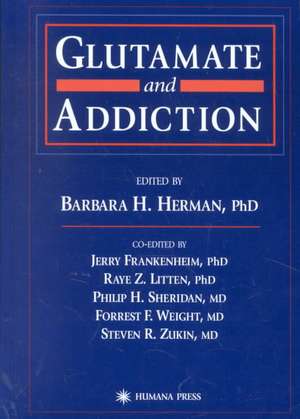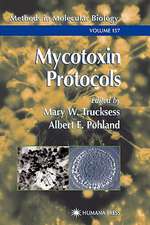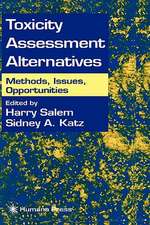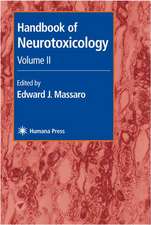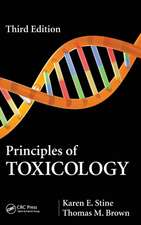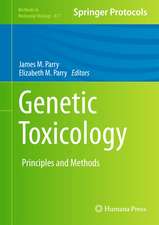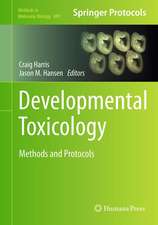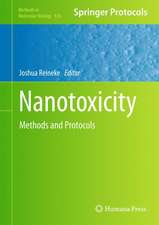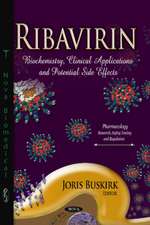Glutamate and Addiction: Contemporary Clinical Neuroscience
Editat de Barbara H. Hermanen Limba Engleză Hardback – 22 aug 2002
| Toate formatele și edițiile | Preț | Express |
|---|---|---|
| Paperback (1) | 1424.68 lei 6-8 săpt. | |
| Humana Press Inc. – 9 noi 2010 | 1424.68 lei 6-8 săpt. | |
| Hardback (1) | 1438.58 lei 6-8 săpt. | |
| Humana Press Inc. – 22 aug 2002 | 1438.58 lei 6-8 săpt. |
Din seria Contemporary Clinical Neuroscience
- 5%
 Preț: 655.43 lei
Preț: 655.43 lei - 18%
 Preț: 958.25 lei
Preț: 958.25 lei - 18%
 Preț: 1678.01 lei
Preț: 1678.01 lei - 18%
 Preț: 1403.22 lei
Preț: 1403.22 lei - 18%
 Preț: 1008.43 lei
Preț: 1008.43 lei - 5%
 Preț: 1407.87 lei
Preț: 1407.87 lei - 18%
 Preț: 1101.40 lei
Preț: 1101.40 lei - 18%
 Preț: 944.19 lei
Preț: 944.19 lei - 18%
 Preț: 1231.01 lei
Preț: 1231.01 lei - 5%
 Preț: 1105.95 lei
Preț: 1105.95 lei - 15%
 Preț: 644.30 lei
Preț: 644.30 lei - 5%
 Preț: 1173.82 lei
Preț: 1173.82 lei - 15%
 Preț: 641.03 lei
Preț: 641.03 lei - 18%
 Preț: 1239.19 lei
Preț: 1239.19 lei - 18%
 Preț: 1229.40 lei
Preț: 1229.40 lei - 18%
 Preț: 1110.24 lei
Preț: 1110.24 lei - 18%
 Preț: 1113.39 lei
Preț: 1113.39 lei - 18%
 Preț: 1225.94 lei
Preț: 1225.94 lei - 15%
 Preț: 651.84 lei
Preț: 651.84 lei - 5%
 Preț: 1103.22 lei
Preț: 1103.22 lei - 18%
 Preț: 1402.55 lei
Preț: 1402.55 lei - 5%
 Preț: 1089.48 lei
Preț: 1089.48 lei - 18%
 Preț: 1828.60 lei
Preț: 1828.60 lei - 5%
 Preț: 1103.75 lei
Preț: 1103.75 lei - 18%
 Preț: 1407.46 lei
Preț: 1407.46 lei - 18%
 Preț: 951.47 lei
Preț: 951.47 lei - 18%
 Preț: 1385.37 lei
Preț: 1385.37 lei
Preț: 1438.58 lei
Preț vechi: 1514.30 lei
-5% Nou
Puncte Express: 2158
Preț estimativ în valută:
275.28€ • 294.36$ • 229.52£
275.28€ • 294.36$ • 229.52£
Carte tipărită la comandă
Livrare economică 17 aprilie-01 mai
Preluare comenzi: 021 569.72.76
Specificații
ISBN-13: 9780896038790
ISBN-10: 0896038793
Pagini: 440
Ilustrații: XVIII, 440 p.
Dimensiuni: 178 x 253 x 27 mm
Greutate: 1.13 kg
Ediția:2002
Editura: Humana Press Inc.
Colecția Humana
Seria Contemporary Clinical Neuroscience
Locul publicării:Totowa, NJ, United States
ISBN-10: 0896038793
Pagini: 440
Ilustrații: XVIII, 440 p.
Dimensiuni: 178 x 253 x 27 mm
Greutate: 1.13 kg
Ediția:2002
Editura: Humana Press Inc.
Colecția Humana
Seria Contemporary Clinical Neuroscience
Locul publicării:Totowa, NJ, United States
Public țintă
Professional/practitionerCuprins
I. Introduction: Physiology and Pharmacology of Glutamate.- 1 Molecular Pharmacology and Physiology of Glutamate Receptors.- 2 Pharmacology of Glutamate Receptors.- 3 Glutamate and Neurotoxicity.- 4 Maturational Regulation of Glutamate Receptors and Their Role in Neuroplasticity.- 5 Role of the NMDA Receptor in Neuronal Apoptosis and HIV-Associated Dementia.- II. Glutamate: Stimulant Drugs of Abuse (Cocaine, Amphetamine, Methamphetamine).- 6 Role of Glutamate and Nitric Oxide in the Acquisition and Expression of Cocaine-Induced Conditioned Increases in Locomotor Activity.- 7 Interactions of Dopamine, Glutamate, and GABA Systems in Mediating Amphetamine- and Cocaine-Induced Stereotypy and Behavioral Sensitization.- 8 Addiction and Glutamate-Dependent Plasticity.- 9 Glutamate and Dopamine Interactions in the Motive Circuit: Implications for Craving.- 10 Glutamate Cascade from Metabotropic Glutamate Receptors to Gene Expression in Striatal Neurons: Implications for Psychostimulant Dependence and Medication.- 11 Glutamate Neurotransmission in the Course of Cocaine Addiction.- 12 Glutamate and the Self-Administration of Psychomotor-Stimulant Drugs.- 13 Roles of Glutamate, Nitric Oxide, Oxidative Stress, and Apoptosis in the Neurotoxicity of Methamphetamine.- 14 Methamphetamine Toxicity: Roles for Glutamate, Oxidative Processes, and Metabolic Stress.- 15 Nitric Oxide-Dependent Processes in the Action of Psychostimulants.- 16 Effects of Novel NMDA/Glycine-Site Antagonists on the Blockade of Cocaine-Induced Behavioral Toxicity in Mice.- 17 Clinical Studies Using NMDA Receptor Antagonists in Cocaine and Opioid Dependence.- 18 The Role of mGluR5 in the Effects of Cocaine: Implications for Medication Development.- III. Glutamate and Opiate Drugs (Heroin) of Abuse.- 19 Role of theGlutamatergic System in Opioid Tolerance and Dependence: Effects of NMDA Receptor Antagonists.- 20 The Role of NMDA Receptors in Opiate Tolerance, Sensitization, and Physical Dependence: A Review of the Research, A Cellular Model, and Implications for the Treatment of Pain and Addiction.- 21 Modification of Conditioned Reward by N-Methyl-D-aspartate Receptor Antagonists.- 22 Morphine Withdrawal as a State of Glutamate Hyperactivity: The Effects of Glutamate Receptor Subtype Ligands on Morphine Withdrawal Symptoms.- IV. Glutamate and Alcohol Abuse and Alcoholism.- 23 Alcohol Actions on Glutamate Receptors.- 24 Glutamate and Alcohol-Induced Neurotoxicity.- 25 Role of Glutamate in Alcohol Withdrawal Kindling.- 26 Alcohol and Glutamate Neurotransmission in Humans: Implications for Reward, Dependence, and Treatment.- 27 Mechanism of Action of Acamprosate Focusing on the Glutamatergic System.- 28 The NMDA/Nitric Oxide Synthase Cascade in Opioid Analgesia and Tolerance.- 29 Overview of Clinical Studies for Acamprosate.
Recenzii
"Illuminating, authoritative, and forward looking, Glutamate and Addiction clarifies for the first time the relationship between glutamatergic systems and addiction investigations of many of today's emerging therapeutics for addictive disorders." -Biomedicine and Pharmacotherapy
Textul de pe ultima copertă
The past decade has witnessed a growing body of preclinical and clinical evidence that glutamatergic systems may play a pivotal role in drug dependence. In Glutamate and Addiction, world-renowned scientific experts critically review all of this evidence and make the case for the role of glutamatergic systems in both the etiology and treatment of addiction disorders. The authors examine the glutamate connection in stimulant drugs of abuse (cocaine, amphetamine, and methamphetamine), in opiate addiction, and in alcohol abuse and dependence. Using a variety of pharmacological, biochemical, genetic, and brain imaging techniques, these investigators show precisely how glutamate is involved in the etiology of addictions and how blocking or activating certain elements of the glutamatergic system appear to alleviate particular components of addiction. Their survey takes in both clinical approaches using medications that influence glutamate and cutting-edge preclinical approaches that manipulate specific subtypes of glutamate receptors or specific substrates of the "glutamate cascade" to determine their roles in various addictive states. The discussion includes a full review of possible treatments of addiction using glutamatergic antagonists and co-agonists such as acamprosate to modify specific aspects of glutamate function in the central nervous system.
Illuminating, authoritative, and forward looking, Glutamate and Addiction clarifies for the first time the relationship between glutamatergic systems and addiction and sets the stage for productive experimental and clinical investigations of many of today's emerging therapeutics for addictive disorders.
Illuminating, authoritative, and forward looking, Glutamate and Addiction clarifies for the first time the relationship between glutamatergic systems and addiction and sets the stage for productive experimental and clinical investigations of many of today's emerging therapeutics for addictive disorders.
Caracteristici
Includes supplementary material: sn.pub/extras
